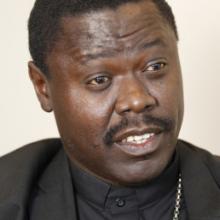car
SINCE WAR BROKE out in the Central African Republic in March 2013, the international community has referred to it as a “religious conflict.” When the media cover the violence at all, they usually frame it as a story of Muslims against Christians. However, to call this conflict a war of religion is simplistic at best and a smokescreen for the real causes at worst.
That is the message that Central African Republic (CAR) faith leaders—Catholic, evangelical, and Muslim—have worked tirelessly to spread, at great personal cost. Imam Omar Kobine Layama, president of the Central African Islamic Community, Catholic Archbishop Dieudonné Nzapalainga of Bangui, and Rev. Nicolas Guérékoyame-Gbangou, president of the Evangelical Alliance of the Central African Republic, have been at the forefront of their country’s peace and reconciliation movement.
During a November 2014 interview in Washington, D.C., Archbishop Nzapalainga adamantly refuted the “religious war” narrative.
“Our role is to continually remind our religious believers ... that those people who want to kill people or rape people ... are in contradiction with their faith,” he told Sojourners. “We, for example, have never been telling our believers that they should go out and kill Muslims, and the imam has never been telling his followers that they should go out and kill Christians.”
“Since you are believers, I will speak to you as believers,” the archbishop told us, before explaining how he and his two colleagues — a Muslim imam and an evangelical pastor — have drawn on their faith in order to work for peace and reconciliation in Central African Republic (CAR). “If we want our hearts to be … like the heart of God, we need to learn to love other people, we need to learn to live in peace with them and to take them in. This is the only way we will be true children of God."
When the Seleka, a loose coalition of predominantly Muslim rebels, overturned CAR’s government in 2013, the anti-balaka, a loose coalition of predominantly Christian fighters, began to retaliate. At face value, the conflict seemed to be a religious one, event though Christians and Muslims in CAR have co-existed in relative peace for much of its 50-year history. Yet the twin forces of political instability and lack of economic opportunity have created an environment in which militias and rebel groups can prey upon young, unemployed men who see no hope for a future unless they fight for it.
Despite the chaos and conflict that have raged throughout CAR since March 2013, Dieudonné Nzapalainga, the Catholic Archbishop of Bangui, Imam Oumar Kobine Layama, President of the Central African Islamic Community, and Rev. Nicolas Guérékoyame-Gbangou, President of the Evangelical Alliance of the Central African Republic, have united to teach their flocks what it means to be “true children of God.” As news reports have focused on the violence and displacement of some 800,000 Central African Republicans, these three faith leaders have instead focused more deeply on what their faith traditions tell them is true. And that faith has propelled them to seek peace and reconciliation in their war-torn country.
For their work, the three leaders were jointly listed among TIME’s 100 Most Influential People in April and received an award from Search for Common Ground last week.
“When politicians wanted to use the religious fibers to divide the people, whether to maintain power or to conquer it, we stood up as if we were a single man to say ‘non’ to this war and ‘yes’ to peace,” the archbishop said in his acceptance speech.
This weekend we’ll commemorate the too-short life and great work of Dr. Martin Luther King Jr. While we rightly celebrate his life dedicated to advancing equality for all, too often we overlook his call to peacemaking. This year, in light of conflicts in Syria, South Sudan, and an often-overlooked war in Central African Republic, we should remember his words.
In his 1967 speech, “Beyond Vietnam — A Time to Break Silence,” King opposed the violence, saying:
"To me the relationship of this ministry [of Jesus Christ] to the making of peace is so obvious that I sometimes marvel at those who ask me why I'm speaking against the war. Could it be that they do not know that the good news was meant for all men — for Communist and capitalist, for their children and ours, for black and for white, for revolutionary and conservative?"
Those aware of our long history at Sojourners know that we have always been committed to peace, to opposing unjust wars and finding nonviolent solutions wherever possible. And in all the work we do, we aim to speak out for the least of these, the poorest and most vulnerable.
After months of violence in the Central African Republic, signs of hope emerged following Friday’s esignation of interim President Michel Djotodia and Prime Minister Nicholas Tiengaye.
But Roman Catholic Archbishop Nestor Desire Nongo-Aziagbia of Bossangoa said that although guns had gone silent, the crisis was far from over.
“The shooting has ceased, but the tensions are still there,” Nongo-Aziagbia said Monday. “Resignation is a first step towards solving the crisis.”
The resignations at a regional summit in neighboring Chad sparked wild celebrations among Christians in the capital, Bangui. The president was a Muslim.
The recent British film In Our Name is a returning-soldier drama featuring a married woman, Suzy, who leaves her husband and little girl to fight in Iraq. Because she's involved in the killing of a little girl during her tour-this part is based on a true story, but it happened to a man -- she returns home only to steadily fall apart under the stress of soul-destroying anxieties.
[Continued from part 1] I have no idea how the United States will or can get out of the economic mess we've spent the last 50 years getting ourselves into. As individuals, though, we can take steps to avoid disaster.




